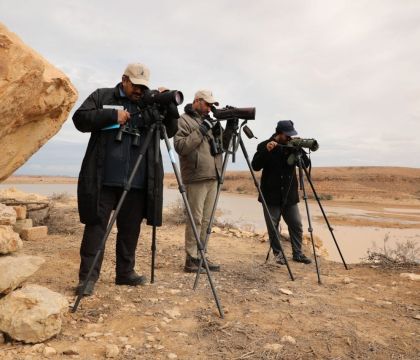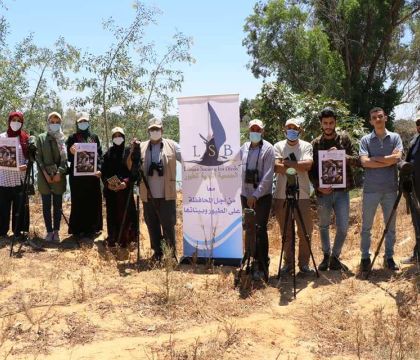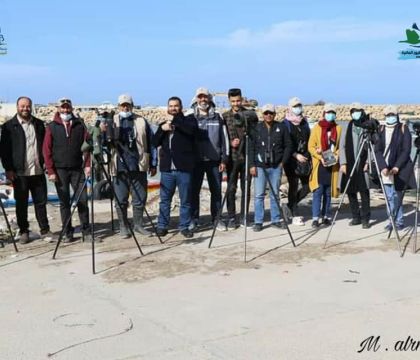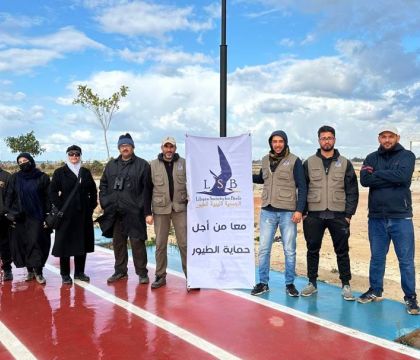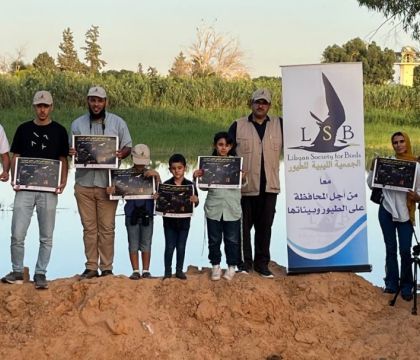International Waterbird Census (IWC)
The International Waterbird Census (IWC) is an international scientific program aimed at monitoring the numbers and distribution of migratory waterbirds during the winter season. This census is conducted annually, seeking to collect long-term data on various waterbird species, which is crucial for understanding population trends, environmental changes, and identifying key sites of ecological importance for birds.
The IWC is primarily organized by Wetlands International, in collaboration with numerous local and regional partners, along with support from volunteers and environmental scientists worldwide. The census focuses on birds inhabiting wetlands during the winter, aiming to detect changes in their numbers and distribution, thereby guiding wetland conservation efforts and species protection.
The program began in 1967 and has since become one of the largest international waterbird monitoring projects, providing vital data for biodiversity conservation and the development of environmental policies.
The IWC is usually conducted in January each year. This period is chosen because it represents mid-winter in most regions traversed by migratory birds, when the birds are settled in their wintering sites, providing an excellent opportunity to accurately estimate their numbers and identify their main congregating areas in wetlands.
Libya began participating in the International Waterbird Census in 2005, under the supervision of the Ministry of Environment (formerly the General Environmental Authority), as part of efforts to protect biodiversity and preserve the environment, particularly wetlands, which are important habitats for many migratory bird species. Several specialists and bird enthusiasts were trained in monitoring and census techniques, making Libya an active part of this international program and enhancing efforts to conserve migratory waterbirds in the country.
Since 2011, after the establishment of the Libyan Society for Birds (LSB), it has become the responsible body for this program in Libya. The LSB has collaborated with several local institutions and organizations to implement the program, including: the Ministry of Environment, University of Tripoli, Alhaya Organization for Protection of Wildlife and Marine Organisms, Libyan Organization for Nature Conservation, BESIDA Environmental Association for the protection of Qataiya Island and Fruwah Lake, Badu Environmental Association for the protection of marine and terrestrial life, and the National Center for Research on Tropical and Transboundary Diseases.
{
"type": "line",
"data": {
"labels": [
"2005",
"2006",
"2007",
"2008",
"2009",
"2010",
"2011",
"2012",
"2013",
"2014",
"2015",
"2016",
"2017",
"2018",
"2019",
"2020",
"2021",
"2022",
"2023",
"2024",
"2025"
],
"datasets": [
{
"backgroundColor": "#3B8BC0",
"barPercentage": 0.9,
"borderColor": "#3B8BC0",
"borderWidth": 3,
"label": "Number of Waterbirds",
"data": [
29996,
51698,
39303,
53632,
40369,
51652,
34842,
29258,
5308,
7761,
1930,
5040,
10488,
24815,
25480,
14205,
17091,
61850,
41842,
30427,
35368
]
}
]
},
"debug": true,
"options": {
"indexAxis": "x",
"maintainAspectRatio": false,
"scales": {
"y": {
"position": "left",
"ticks": {
"color": "#2E4157",
"font": {
"family": "'Almarai'",
"size": "14"
}
},
"title": {
"color": "#2E4157",
"display": true,
"font": {
"family": "'Almarai'",
"size": "14"
},
"text": "Number of Waterbirds"
}
},
"x": {
"grid": {
"lineWidth": 0
},
"position": "bottom",
"ticks": {
"color": "#2E4157",
"font": {
"family": "'Almarai'",
"size": "14"
}
},
"title": {
"color": "#2E4157",
"font": {
"family": "'Almarai'",
"size": "14"
},
"text": "Years"
}
}
},
"plugins": {
"title": {
"color": "#2E4157",
"display": true,
"font": {
"family": "'Almarai'",
"size": "14"
},
"text": "Winter Census Data 2005\u20132024 for Waterbirds"
},
"subtitle": {
"display": true,
"font": {
"family": "'Almarai'",
"size": 12
}
},
"legend": {
"display": false
},
"tooltip": {
"backgroundColor": "#2E4157",
"displayColors": false,
"padding": 10
}
},
"animation": {
"enabled": true
}
}
}
{
"type": "line",
"data": {
"labels": [
"2005",
"2006",
"2007",
"2008",
"2009",
"2010",
"2011",
"2012",
"2013",
"2014",
"2015",
"2016",
"2017",
"2018",
"2019",
"2020",
"2021",
"2022",
"2023",
"2024",
"2025"
],
"datasets": [
{
"backgroundColor": "#3B8BC0",
"barPercentage": 0.9,
"borderColor": "#3B8BC0",
"borderWidth": 3,
"label": "Number of Waterbird Species",
"data": [
79,
85,
92,
79,
65,
86,
81,
66,
46,
58,
37,
47,
64,
54,
63,
46,
60,
68,
64,
66,
69
]
}
]
},
"debug": true,
"options": {
"indexAxis": "x",
"maintainAspectRatio": false,
"scales": {
"y": {
"position": "left",
"ticks": {
"color": "#2E4157",
"font": {
"family": "'Almarai'",
"size": "14"
}
},
"title": {
"color": "#2E4157",
"display": true,
"font": {
"family": "'Almarai'",
"size": "14"
},
"text": "Number of Waterbird Species"
}
},
"x": {
"grid": {
"lineWidth": 0
},
"position": "bottom",
"ticks": {
"color": "#2E4157",
"font": {
"family": "'Almarai'",
"size": "14"
}
},
"title": {
"color": "#2E4157",
"font": {
"family": "'Almarai'",
"size": "14"
},
"text": "Years"
}
}
},
"plugins": {
"title": {
"color": "#2E4157",
"display": true,
"font": {
"family": "'Almarai'",
"size": "14"
},
"text": "Winter Census Data 2005\u20132024 for Waterbird Species"
},
"subtitle": {
"display": true,
"font": {
"family": "'Almarai'",
"size": 12
}
},
"legend": {
"display": false
},
"tooltip": {
"backgroundColor": "#2E4157",
"displayColors": false,
"padding": 10
}
},
"animation": {
"enabled": true
}
}
}
{
"type": "line",
"data": {
"labels": [
"2005",
"2006",
"2007",
"2008",
"2009",
"2010",
"2011",
"2012",
"2013",
"2014",
"2015",
"2016",
"2017",
"2018",
"2019",
"2020",
"2021",
"2022",
"2023",
"2024",
"2025"
],
"datasets": [
{
"backgroundColor": "#3B8BC0",
"barPercentage": 0.9,
"borderColor": "#3B8BC0",
"borderWidth": 3,
"label": "Number of sites",
"data": [
65,
56,
43,
50,
49,
94,
84,
42,
16,
12,
6,
10,
29,
34,
32,
12,
32,
62,
58,
56,
58
]
}
]
},
"debug": true,
"options": {
"indexAxis": "x",
"maintainAspectRatio": false,
"scales": {
"y": {
"position": "left",
"ticks": {
"color": "#2E4157",
"font": {
"family": "'Almarai'",
"size": "14"
}
},
"title": {
"color": "#2E4157",
"display": true,
"font": {
"family": "'Almarai'",
"size": "14"
},
"text": "Number of sites"
}
},
"x": {
"grid": {
"lineWidth": 0
},
"position": "bottom",
"ticks": {
"color": "#2E4157",
"font": {
"family": "'Almarai'",
"size": "14"
}
},
"title": {
"color": "#2E4157",
"font": {
"family": "'Almarai'",
"size": "14"
},
"text": "Years"
}
}
},
"plugins": {
"title": {
"color": "#2E4157",
"display": true,
"font": {
"family": "'Almarai'",
"size": "14"
},
"text": "Winter census data 2005\u20132024 for the sites"
},
"subtitle": {
"display": true,
"font": {
"family": "'Almarai'",
"size": 12
}
},
"legend": {
"display": false
},
"tooltip": {
"backgroundColor": "#2E4157",
"displayColors": false,
"padding": 10
}
},
"animation": {
"enabled": true
}
}
}
